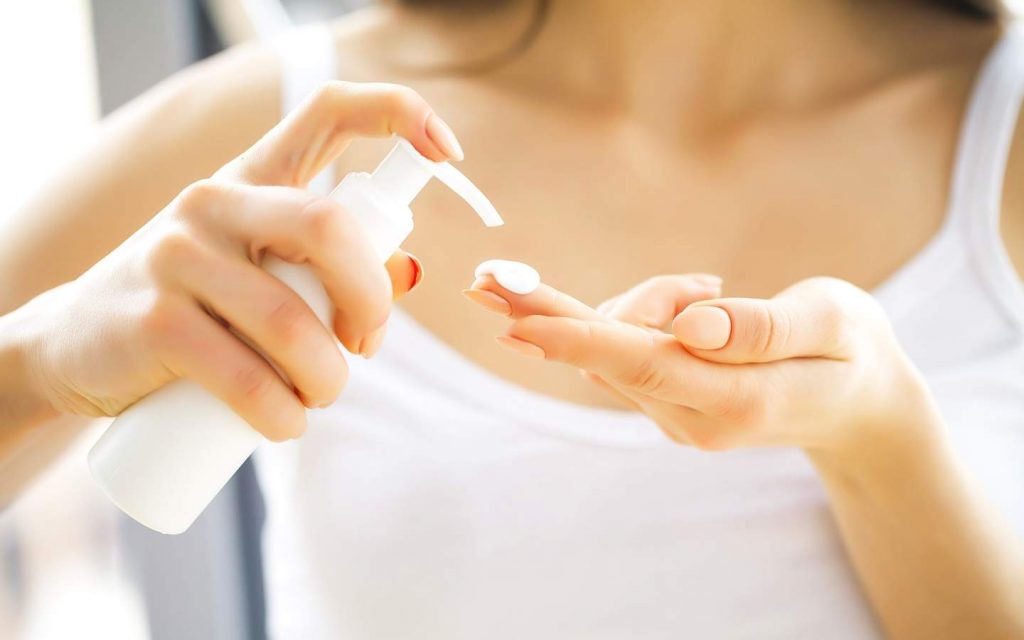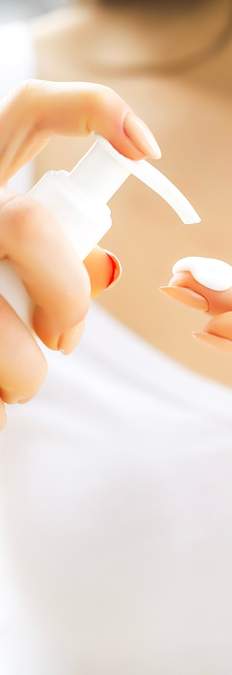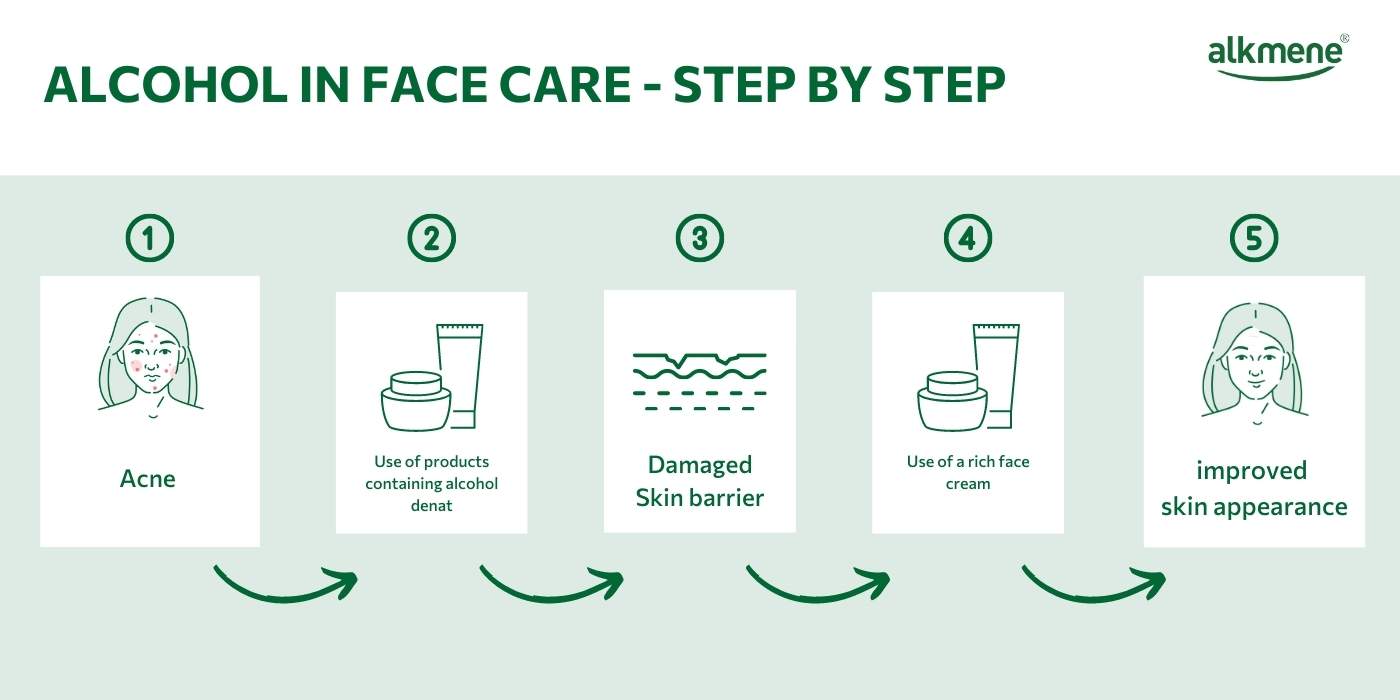

In skin care, not all alcohol is the same. Which alcohol is beneficial in facial care and which is allowed on the ingredient list, we tell you here.
Which alcohols are used in facial care products? Should alcohol even be found in facial creams, cleansers, scrubs and the like? To answer this question, one should first distinguish between the many different alcohols, because not all alcohols are the same. Depending on their chemical and physical properties, they have different effects. Here we tell you which alcohol is beneficial in facial care and may be included in the list of ingredients.
What is alcohol in skin care anyway?

In general, there is no one alcohol. From a chemical point of view, alcohols are a class of various organic compounds that have at least one hydroxyl group (-OH) in common. When one speaks of the classic alcohol, one usually means ethanol or alcohol denat. If these are contained in facial care products, they should be used with caution, because in excessive quantities these types of alcohols often have an irritating effect and can damage the skin barrier. In contrast, there are also skin-caring alcohols such as stearyl alcohol or cetearyl alcohol. These are the so-called fatty alcohols.
But why are some alcohols in cosmetics highly controversial?
A generalization of all alcohols is not possible. Although they are grouped together under one substance group, different alcohols have different chemical and physical properties. Therefore, they are also a highly debated topic in facial and skin care.
Controversial alcohols in skin care are:
- Ethanol, Ethyl Alcohol, SD Alcohol.
- Methanol
- Propyl alcohol
- Isopropyl alcohol
- Benzyl alcohol
- Phenethyl alcohol
In principle, alcohols are used relatively frequently in cosmetics because they have a wide range of uses and have, among other things, emulsifying and skin-conditioning properties. Depending on the application, these have positive or negative effects. If, for example, an ethanol-containing hygiene hand gel is used for the purpose of disinfecting or cleaning the hands, the ethanol is essential here.
However, if care products for the face contain e.g. ethyl alcohol or alcohol denat, this should be used with caution. The most prominent representative, ethyl alcohol, as well as some other alcohols attack the natural skin barrier and dry out the skin if the dosage is too high. However, this can be counteracted with a nourishing and rich cream.
Since controversial alcohols can also have positive effects on facial care products, skin care companies use some alcohols in their products.
Alcohol and its benefits in cosmetics
On the one hand, alcohol can cause thick skin care products to become quite light. This makes the skin feel pleasant. In addition, the alcohol often serves as a preservative in the care products. Its antimicrobial effect makes it possible that no bacteria can multiply in the product and on the skin.
The skin is also very good at rejecting ingredients. Thus, skin care products or beneficial serums such as vitamin C or retinol may not be properly absorbed by the skin. Alcohol can help skin care products to be better absorbed. It breaks down the skin’s natural barrier, allowing the skin care products to penetrate better. However, to ensure that the skin barrier is not destroyed, one should always use a complete skin care routine including a nourishing cream.
Fatty alcohol - The good alcohol
There is a class of ingredients called fatty alcohols that are generally well tolerated by the skin, but are often not differentiated from the bad alcohols such as ethanol and denatured alcohol (alcohol denat). Cetyl alcohol and stearyl alcohol are two examples of fatty alcohols. Generally, fatty alcohols are used as adjuvants in skin care products. They are non-irritating and may even be beneficial for dry skin. For skin, fatty alcohols are far from skin-damaging, so alcohol denat should not be confused with fatty alcohols.
Safe alcohols to use in your skin care routine are:
- Cetyl alcohol
- Cetearyl alcohol
- Stearyl alcohol
- Lauryl alcohol
- Myristyl alcohol
- Palmitoleyl alcohol
- Oleyl alcohol
- Arachidyl alcohol
- Lanolin alcohol
- Behenyl alcohol
Controversial alcohols, acne and oily skin
For people with acne or oily skin, alcohol in their skin care products can have a beneficial effect.
For one thing, alcohol can kill the acne-causing bacteria on the surface of the skin, which is why some people turn to alcohol-based anti-acne products. For another, alcohol can quickly degrease the skin. For this reason, it sometimes makes sense to use products with alcohol. Our MY TEA TREE OIL pimple swab and facial toner, for example, also have this ingredient. This can achieve a fast and effective pimple reduction.
However, it is important to combine these with other products in order not to damage the skin barrier. Therefore, a face cream should also be used that is rich and nourishing and does not contain alcohol denat.
If you do not moisturize your skin enough and continue to use products that contain alcohol denat, this can lead to permanent irritation and dryness. This makes the skin more susceptible to inflammation. The result: red spots that are even more stubborn than before. The skin diseases neurodermatitis or dermatitis can also be favored by this.

At what point is alcohol in facial care harmful?
Although there are better and less good alcohols, care should be taken not to include too much alcohol in any facial care product. A concentration of 30 to 40 percent can cause irritation and dry out the skin. In addition, the sebaceous layer of the skin is destroyed.
In general, it should be borne in mind that the division into “good” and “bad” alcohols is quite arbitrary, since depending on the application, “bad” alcohols also have positive properties. These alcohols are mainly used in products against oily skin or acne, because they disinfect the skin surface and remove the greasy film. However, to make sure that these products do not destroy the natural skin barrier, you should always use a nourishing and rich cream afterwards. For this reason, alcohol in skin care can harm the skin if used incorrectly, it does not have to with a complete care routine.
